中考易混词汇辨析总结
- 格式:doc
- 大小:15.08 KB
- 文档页数:6
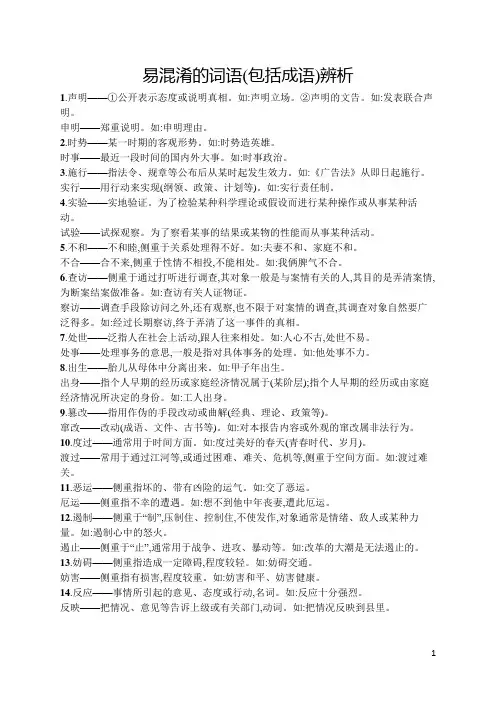
易混淆的词语(包括成语)辨析1.声明——①公开表示态度或说明真相。
如:声明立场。
②声明的文告。
如:发表联合声明。
申明——郑重说明。
如:申明理由。
2.时势——某一时期的客观形势。
如:时势造英雄。
时事——最近一段时间的国内外大事。
如:时事政治。
3.施行——指法令、规章等公布后从某时起发生效力。
如:《广告法》从即日起施行。
实行——用行动来实现(纲领、政策、计划等)。
如:实行责任制。
4.实验——实地验证。
为了检验某种科学理论或假设而进行某种操作或从事某种活动。
试验——试探观察。
为了察看某事的结果或某物的性能而从事某种活动。
5.不和——不和睦,侧重于关系处理得不好。
如:夫妻不和、家庭不和。
不合——合不来,侧重于性情不相投,不能相处。
如:我俩脾气不合。
6.查访——侧重于通过打听进行调查,其对象一般是与案情有关的人,其目的是弄清案情,为断案结案做准备。
如:查访有关人证物证。
察访——调查手段除访问之外,还有观察,也不限于对案情的调查,其调查对象自然要广泛得多。
如:经过长期察访,终于弄清了这一事件的真相。
7.处世——泛指人在社会上活动,跟人往来相处。
如:人心不古,处世不易。
处事——处理事务的意思,一般是指对具体事务的处理。
如:他处事不力。
8.出生——胎儿从母体中分离出来。
如:甲子年出生。
出身——指个人早期的经历或家庭经济情况属于(某阶层);指个人早期的经历或由家庭经济情况所决定的身份。
如:工人出身。
9.篡改——指用作伪的手段改动或曲解(经典、理论、政策等)。
窜改——改动(成语、文件、古书等)。
如:对本报告内容或外观的窜改属非法行为。
10.度过——通常用于时间方面。
如:度过美好的春天(青春时代、岁月)。
渡过——常用于通过江河等,或通过困难、难关、危机等,侧重于空间方面。
如:渡过难关。
11.恶运——侧重指坏的、带有凶险的运气。
如:交了恶运。
厄运——侧重指不幸的遭遇。
如:想不到他中年丧妻,遭此厄运。
12.遏制——侧重于“制”,压制住、控制住,不使发作,对象通常是情绪、敌人或某种力量。
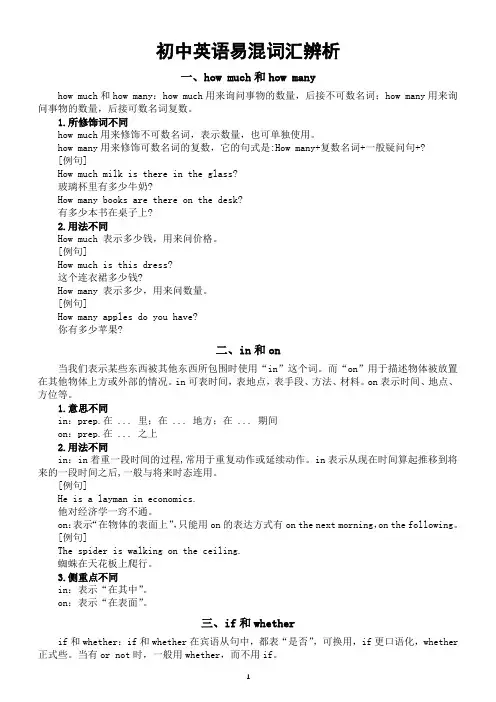
初中英语易混词汇辨析一、how much和how manyhow much和how many:how much用来询问事物的数量,后接不可数名词;how many用来询问事物的数量,后接可数名词复数。
1.所修饰词不同how much用来修饰不可数名词,表示数量,也可单独使用。
how many用来修饰可数名词的复数,它的句式是:How many+复数名词+一般疑问句+?[例句]How much milk is there in the glass?玻璃杯里有多少牛奶?How many books are there on the desk?有多少本书在桌子上?2.用法不同How much 表示多少钱,用来问价格。
[例句]How much is this dress?这个连衣裙多少钱?How many 表示多少,用来问数量。
[例句]How many apples do you have?你有多少苹果?二、in和on当我们表示某些东西被其他东西所包围时使用“in”这个词。
而“on”用于描述物体被放置在其他物体上方或外部的情况。
in可表时间,表地点,表手段、方法、材料。
on表示时间、地点、方位等。
1.意思不同in:prep.在 ... 里;在 ... 地方;在 ... 期间on:prep.在 ... 之上2.用法不同in:in着重一段时间的过程,常用于重复动作或延续动作。
in表示从现在时间算起推移到将来的一段时间之后,一般与将来时态连用。
[例句]He is a layman in economics.他对经济学一窍不通。
on:表示“在物体的表面上”,只能用on的表达方式有on the next morning,on the following。
[例句]The spider is walking on the ceiling.蜘蛛在天花板上爬行。
3.侧重点不同in:表示“在其中”。
on:表示“在表面”。
三、if和whetherif和whether:if和whether在宾语从句中,都表“是否”,可换用,if更口语化,whether 正式些。
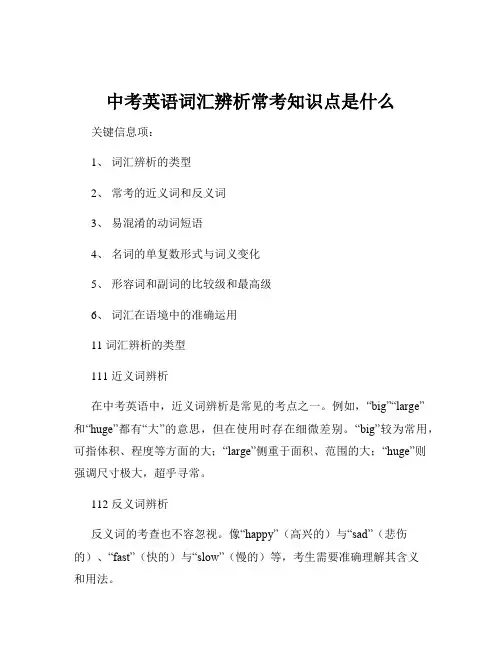
中考英语词汇辨析常考知识点是什么关键信息项:1、词汇辨析的类型2、常考的近义词和反义词3、易混淆的动词短语4、名词的单复数形式与词义变化5、形容词和副词的比较级和最高级6、词汇在语境中的准确运用11 词汇辨析的类型111 近义词辨析在中考英语中,近义词辨析是常见的考点之一。
例如,“big”“large”和“huge”都有“大”的意思,但在使用时存在细微差别。
“big”较为常用,可指体积、程度等方面的大;“large”侧重于面积、范围的大;“huge”则强调尺寸极大,超乎寻常。
112 反义词辨析反义词的考查也不容忽视。
像“happy”(高兴的)与“sad”(悲伤的)、“fast”(快的)与“slow”(慢的)等,考生需要准确理解其含义和用法。
113 形似词辨析一些词汇在拼写和发音上相似,但词义完全不同。
如“quite”(相当)和“quiet”(安静的),“accept”(接受)和“except”(除之外)。
12 常考的近义词和反义词121 常见的近义词“look”“see”“watch”都与“看”有关,但“look”强调看的动作,“see”侧重于看的结果,“watch”则常指观看活动、比赛等。
“spend”“cost”“take”“pay”都有“花费”之意,“spend”主语是人,“cost”主语是物,“take”通常用于“it takes sb some time to do sth”句型,“pay”常与“for”搭配。
122 常见的反义词“good”与“bad”、“right”与“wrong”、“many”与“few”、“much”与“little”等反义词在中考中经常出现,需要考生清晰掌握其用法和区别。
13 易混淆的动词短语131 由“put”构成的动词短语“put on”(穿上)、“put off”(推迟)、“put up”(张贴;举起)、“put away”(收拾好)等,这些短语的含义和用法各不相同。
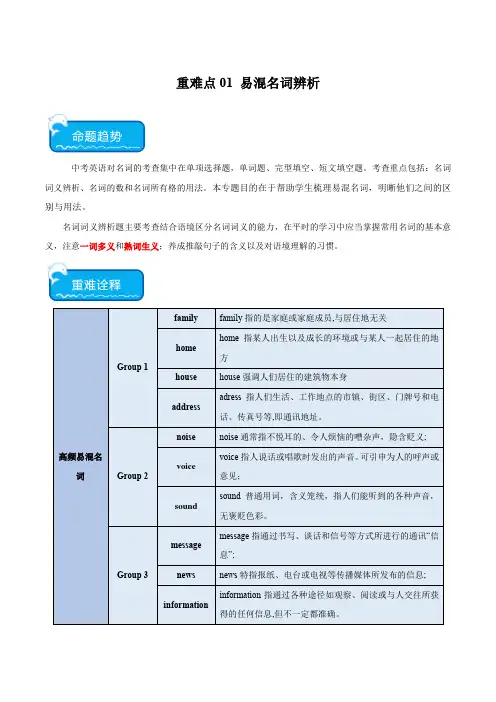
重难点01 易混名词辨析中考英语对名词的考查集中在单项选择题,单词题、完型填空、短文填空题。
考查重点包括:名词词义辨析、名词的数和名词所有格的用法。
本专题目的在于帮助学生梳理易混名词,明晰他们之间的区别与用法。
名词词义辨析题主要考查结合语境区分名词词义的能力,在平时的学习中应当掌握常用名词的基本意义,注意一词多义和熟词生义;养成推敲句子的含义以及对语境理解的习惯。
(2023中考真题建议用时:15分钟)1.(2023·辽宁鞍山·中考真题)—Why does Mary get good grades each time?—I think that’s because she puts most of her ________ into her schoolwork.A.energy B.practice C.exercise D.process2.(2023·内蒙古·中考真题)—The model plane is wonderful! How did you make it?—It’s easy. Follow the ________ and you can do it, too.A.discussion B.education C.conditions D.instructions3.(2023·江苏淮安·中考真题)As a student, you should keep a ________ between your schoolwork and yourhobbies.A.diary B.record C.secret D.balance4.(2023·湖北襄阳·中考真题)—Mr. Fan runs at least half an hour every day.—What a good ________! No wonder he looks healthy.A.habit B.question C.article D.prediction5.(2023·湖北黄石·中考真题)—Could you tell me the ________ of making such tasty dumplings?—Well, I just follow the steps on Tiktok.A.cost B.method C.time D.menu6.(2023·内蒙古呼和浩特·中考真题)High-speed trains are seen as one of the new Four Great ________ of China.A.Inventions B.Advantages C.Environments D.Technologies7.(2023·江苏常州·中考真题)After she was brought back to China, the sick giant panda Ya Ya received good ________ in her new home and got better.A.education B.communication C.entertainment D.treatment8.(2023·江苏南通·中考真题)—________ are easily made, but not easily kept.—That’s true. Once you make one, be sure to keep it.A.Speeches B.Decisions C.Promises D.Suggestions9.(2023·江苏镇江·中考真题)The main ________ of the cities along the Grand Canal (大运河) is history and culture.A.attraction B.pollution C.invention D.situation10.(2023·青海·中考真题)A taxi driver prevented (阻止) an _________ when he saw a car with serious problems travelling across Huangnan.A.accident B.interview C.advertisement11.(2023·山东青岛·中考真题)Before flying a plane, a ________ must take a lot of training.A.policeman B.musician C.nurse D.pilot12.(2023·湖北十堰·中考真题)—How did you fix up the machine, dad?—It’s easy. I just followed the ________.A.instructions B.inventions C.interviews D.influences13.(2023·江苏徐州·中考真题)Of all the ________, I love summer best.A.seasons B.subjects C.colours D.hobbies14.(2023·辽宁丹东·中考真题)Mary’s parents are interested in ________, so they often take her to concerts.A.sports B.music C.science D.movies15.(2023·江苏宿迁·中考真题)—The girl’s beautiful pronunciation caught our ________ in yesterday’s English speech competition.—Yes, many students couldn’t help cheering for her.A.condition B.attention C.invention D.position16.(2023·江苏泰州·中考真题)—Good news! The Chinese women table tennis team won a gold and a silver again.—Great! No matter who wins the medals, it is the ________ of our country.A.price B.pioneer C.pride D.pain17.(2023·黑龙江牡丹江·中考真题)Although our school life is a little busy, it is full of ________.A.pain B.sadness C.laughter18.(2023·四川遂宁·中考真题)—Which movie would you like to watch, Tracy?— Um…it’s hard to make a ________.A.survey B.choice C.call D.wish19.(2023·辽宁·中考真题)Thanks to the teacher’s help, I solved all the ________ easily.A.chances B.problems C.habits D.grades20.(2023·辽宁营口·中考真题)Scientists who are full of ________ always come up with new ideas and bring great changes to our life.A.instruction B.instrument C.invention D.introduction1.A【详解】句意:——为什么玛丽每次都取得好成绩?——我想那是因为她把大部分精力都放在功课上了。
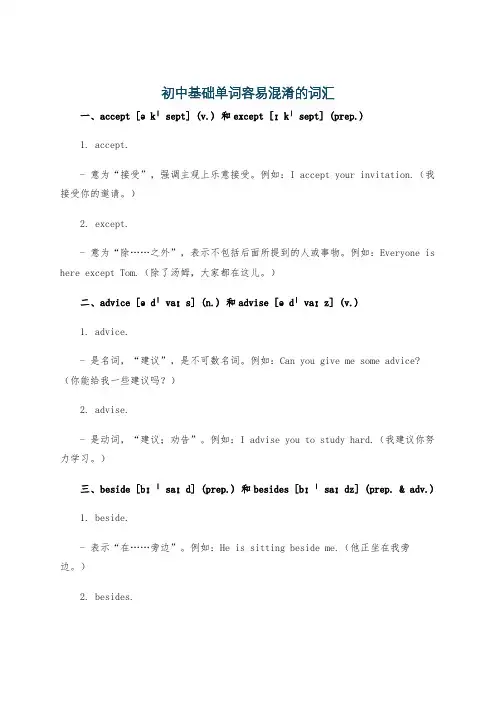
初中基础单词容易混淆的词汇一、accept [əkˈsept] (v.) 和except [ɪkˈsept] (prep.)1. accept.- 意为“接受”,强调主观上乐意接受。
例如:I accept your invitation.(我接受你的邀请。
)2. except.- 意为“除……之外”,表示不包括后面所提到的人或事物。
例如:Everyone is here except Tom.(除了汤姆,大家都在这儿。
)二、advice [ədˈvaɪs] (n.) 和advise [ədˈvaɪz] (v.)1. advice.- 是名词,“建议”,是不可数名词。
例如:Can you give me some advice?(你能给我一些建议吗?)2. advise.- 是动词,“建议;劝告”。
例如:I advise you to study hard.(我建议你努力学习。
)三、beside [bɪˈsaɪd] (prep.) 和besides [bɪˈsaɪdz] (prep. & adv.)1. beside.- 表示“在……旁边”。
例如:He is sitting beside me.(他正坐在我旁边。
)2. besides.- 作介词时,意为“除……之外(还有)”;作副词时,意为“而且;此外”。
例如:Besides English, we also learn French.(除了英语,我们还学法语。
);I don't like this dress. Besides, it's too expensive.(我不喜欢这条裙子。
而且,它太贵了。
)四、borrow [ˈbɒrəʊ] (v.) 和lend [lend] (v.)1. borrow.- 意为“借入”,常用搭配borrow sth. from sb.。
例如:I borrow a book from the library.(我从图书馆借了一本书。
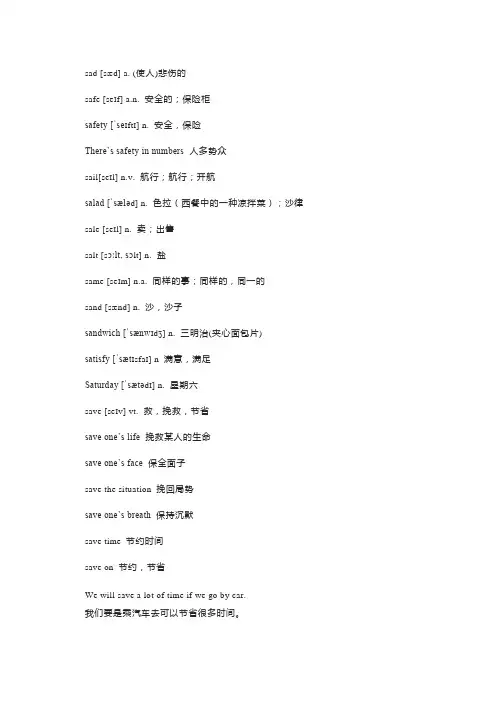
sad [sæd] a. (使人)悲伤的safe [seɪf] a.n. 安全的;保险柜safety [ˈseɪftɪ] n. 安全,保险There’s safety in numbers 人多势众sail[seɪl] n.v. 航行;航行;开航salad [ˈsæləd] n. 色拉(西餐中的一种凉拌菜);沙律sale [seɪl] n. 卖;出售salt [sɔːlt, sɔlt] n. 盐same [seɪm] n.a. 同样的事;同样的,同一的sand [sænd] n. 沙,沙子sandwich [ˈsænwɪdʒ] n. 三明治(夹心面包片)satisfy [ˈsætɪsfaɪ] n 满意,满足Saturday [ˈsætədɪ] n. 星期六save [seɪv] vt. 救,挽救,节省save one’s life 挽救某人的生命save one’s face 保全面子save the situation 挽回局势save one’s breath 保持沉默save time 节约时间save on 节约,节省We will save a lot of time if we go by car.我们要是乘汽车去可以节省很多时间。
say(said, said) [seɪ] vt. 说,讲go without saying 显而易见say to oneself 自言自语scarf[skɑːf] n. 领巾;围巾school [skuːl] n. 学校schoolbag['sku:lbæg] n. 书包science [ˈsaɪəns] n. 科学,自然科学scientist[ˈsaɪəntɪst] n. 科学家scissors [ˈsɪzəz] n. 剪刀score [skɔː(r)] n.&v. 得分;分数a score-keeper 记分员a score –sheet 记分单a score of 二十个screen [skriːn] n. 幕,荧光屏sea[siː] n. 海,海洋in the sea 在海里on the sea 在海滨by sea 乘船a sea of flames 一片火海search [sɜːtʃ] n.&v. 搜寻,搜查search for sb/sth 寻找某人/某物Rescue workers searched all night in the hope of finding more survivors.营救人员彻夜搜寻,希望找到更多的幸存者。
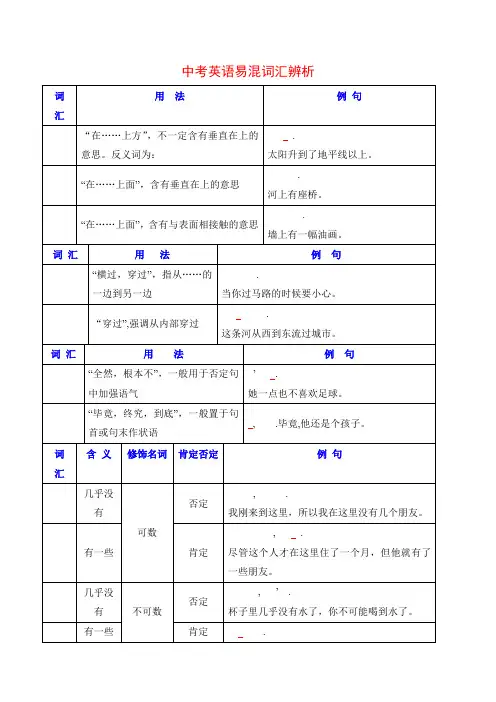
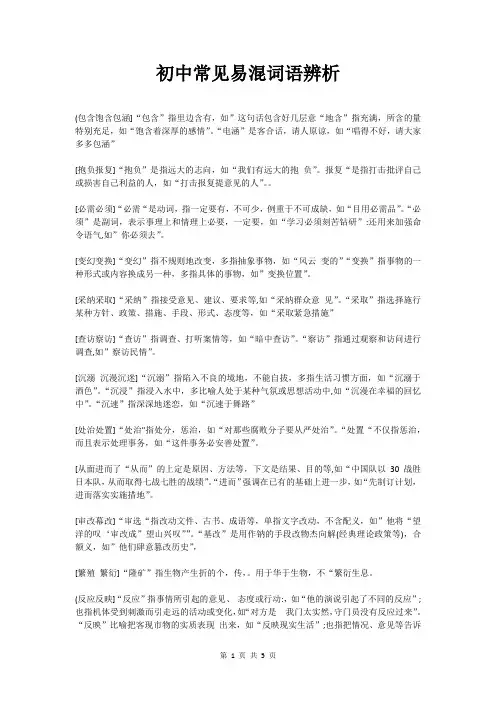
初中常见易混词语辨析(包含饱含包涵]“包含”指里边含有,如”这句话包含好几层意“地含”指充满,所含的量特别充足,如“饱含着深厚的感情”。
“电涵”是客合话,请人原谅,如“唱得不好,请大家多多包涵”[抱负报复]“抱负”是指远大的志向,如“我们有远大的抱负”。
报复“是指打击批评自己或损害自己利益的人,如“打击报复提意见的人”。
[必需必须]“必需“是动词,指一定要有,不可少,例重于不可成缺,如“目用必需品”。
“必须”是副词,表示事理上和情理上必要,一定要,如“学习必须刻苦钻研”:还用来加强命令语气,如”你必须去”。
[变幻变换]“变幻”指不规则地改变,多指抽象事物,如“风云变的”“变换”指事物的一种形式或内容换成另一种,多指具体的事物,如”变换位置”。
[采纳采取]“采纳”指接受意见、建议、要求等,如“采纳群众意见”。
“采取”指选择施行某种方针、政策、措施、手段、形式、态度等,如“采取紧急措施”[查访察访]“查访”指调查、打听案情等,如“暗中查访”。
“察访”指通过观察和访问进行调查,如”察访民情”。
[沉溺沉漫沉迷]“沉溺”指陷入不良的境地,不能自拔,多指生活习惯方面,如“沉溺于酒色”。
“沉浸”指浸入水中,多比喻人处于某种气氛或思想活动中,如“沉漫在幸福的回忆中”。
“沉速”指深深地迷恋,如“沉速于舞路”[处治处置]“处治"指处分,惩治,如“对那些腐败分子要从严处治”。
“处置“不仅指惩治,而且表示处理事务,如“这件事务必安善处置”。
[从面进而了“从而”的上定是原因、方法等,下文是结果、目的等,如“中国队以30战胜日本队,从而取得七战七胜的战绩”。
“进而”强调在已有的基础上进一步,如“先制订计划,进而落实实施措地”。
[审改幕改]“审选“指改动文件、古书、成语等,单指文字改动,不含配义,如”他将“望洋的叹‘审改成”望山兴叹””。
“基改”是用作钠的手段改物杰向解(经典理论政策等),合额义,如”他们肆意篡改历史”,[繁殖繁衍]“隆矿”指生物产生折的个,传,。
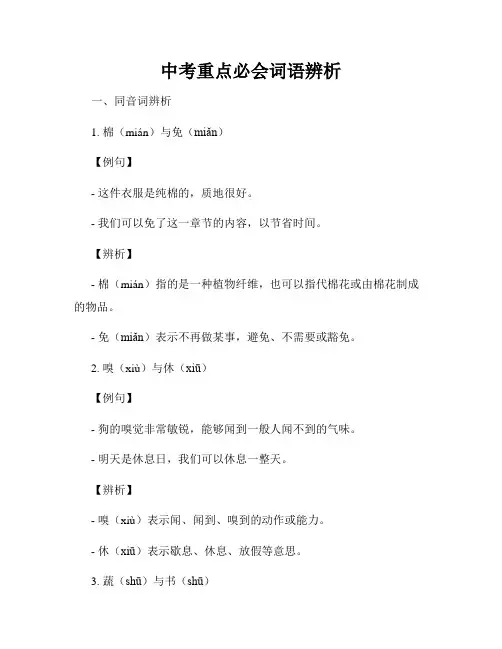
中考重点必会词语辨析一、同音词辨析1. 棉(mián)与免(miǎn)【例句】- 这件衣服是纯棉的,质地很好。
- 我们可以免了这一章节的内容,以节省时间。
【辨析】- 棉(mián)指的是一种植物纤维,也可以指代棉花或由棉花制成的物品。
- 免(miǎn)表示不再做某事,避免、不需要或豁免。
2. 嗅(xiù)与休(xiū)【例句】- 狗的嗅觉非常敏锐,能够闻到一般人闻不到的气味。
- 明天是休息日,我们可以休息一整天。
【辨析】- 嗅(xiù)表示闻、闻到、嗅到的动作或能力。
- 休(xiū)表示歇息、休息、放假等意思。
3. 蔬(shū)与书(shū)【例句】- 妈妈强调我们要多吃蔬菜,保持健康。
- 弟弟正在看一本有趣的书,他很喜欢读书。
【辨析】- 蔬(shū)表示蔬菜、蔬果等的意思。
- 书(shū)指的是书籍或书本。
二、形近词辨析1. 发(fā)与法(fǎ)【例句】- 他每天都在练习发音,希望可以准确地说英语。
- 法律是维护社会秩序的重要手段和保障。
【辨析】- 发(fā)表示发出声音,或者特指发音。
- 法(fǎ)指的是法律、法则等。
2. 空(kōng)与孔(kǒng)【例句】- 外面的空气很清新,我喜欢在户外呼吸新鲜的空气。
- 他用一根细棍在纸上敲打出了孔,方便装订文件。
【辨析】- 空(kōng)指的是没有物体存在的状态,或者指代没有被占用的地方。
- 孔(kǒng)表示孔隙、洞口,有形容有洞的意思。
3. 劝(quàn)与圈(quān)【例句】- 爸爸劝我多读书,他说知识可以改变我的人生。
- 妈妈给小狗戴上了一只圈,以防它跑远了。
【辨析】- 劝(quàn)表示劝导、劝说。
- 圈(quān)是一种闭合的形状,也可以指代一种用绳或线等制成的带环装置。
三、近义词辨析1. 容易与简单【例句】- 这个数学题很容易,我很快就能解出来。
- 制作火锅的步骤很简单,只需要准备好材料就可以了。

初中常见易混词语辨析(包含饱含包涵]“包含”指里边含有,如”这句话包含好几层意“地含”指充满,所含的量特别充足,如“饱含着深厚的感情”。
“电涵”是客合话,请人原谅,如“唱得不好,请大家多多包涵”[抱负报复]“抱负”是指远大的志向,如“我们有远大的抱负”。
报复“是指打击批评自己或损害自己利益的人,如“打击报复提意见的人”。
[必需必须]“必需“是动词,指一定要有,不可少,例重于不可成缺,如“目用必需品”。
“必须”是副词,表示事理上和情理上必要,一定要,如“学习必须刻苦钻研”:还用来加强命令语气,如”你必须去”。
[变幻变换]“变幻”指不规则地改变,多指抽象事物,如“风云变的”“变换”指事物的一种形式或内容换成另一种,多指具体的事物,如”变换位置”。
[采纳采取]“采纳”指接受意见、建议、要求等,如“采纳群众意见”。
“采取”指选择施行某种方针、政策、措施、手段、形式、态度等,如“采取紧急措施”[查访察访]“查访”指调查、打听案情等,如“暗中查访”。
“察访”指通过观察和访问进行调查,如”察访民情”。
[沉溺沉漫沉迷]“沉溺”指陷入不良的境地,不能自拔,多指生活习惯方面,如“沉溺于酒色”。
“沉浸”指浸入水中,多比喻人处于某种气氛或思想活动中,如“沉漫在幸福的回忆中”。
“沉速”指深深地迷恋,如“沉速于舞路”[处治处置]“处治"指处分,惩治,如“对那些腐败分子要从严处治”。
“处置“不仅指惩治,而且表示处理事务,如“这件事务必安善处置”。
[从面进而了“从而”的上定是原因、方法等,下文是结果、目的等,如“中国队以30战胜日本队,从而取得七战七胜的战绩”。
“进而”强调在已有的基础上进一步,如“先制订计划,进而落实实施措地”。
[审改幕改]“审选“指改动文件、古书、成语等,单指文字改动,不含配义,如”他将“望洋的叹‘审改成”望山兴叹””。
“基改”是用作钠的手段改物杰向解(经典理论政策等),合额义,如”他们肆意篡改历史”,[繁殖繁衍]“隆矿”指生物产生折的个,传,。
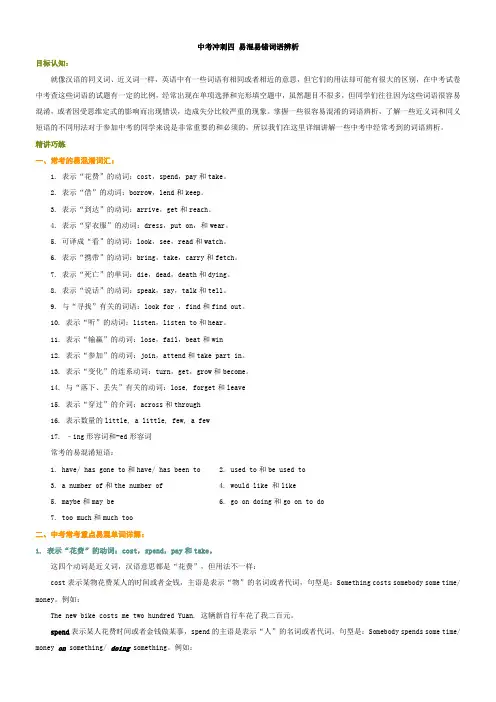
中考冲刺四易混易错词语辨析目标认知:就像汉语的同义词、近义词一样,英语中有一些词语有相同或者相近的意思,但它们的用法却可能有很大的区别,在中考试卷中考查这些词语的试题有一定的比例,经常出现在单项选择和完形填空题中,虽然题目不很多,但同学们往往因为这些词语很容易混淆,或者因受思维定式的影响而出现错误,造成失分比较严重的现象。
掌握一些很容易混淆的词语辨析,了解一些近义词和同义短语的不同用法对于参加中考的同学来说是非常重要的和必须的,所以我们在这里详细讲解一些中考中经常考到的词语辨析。
精讲巧练一、常考的易混淆词汇:1. 表示“花费”的动词:cost,spend,pay和take。
2. 表示“借”的动词:borrow,lend和keep。
3. 表示“到达”的动词:arrive,get和reach。
4. 表示“穿衣服”的动词:dress,put on,和wear。
5. 可译成“看”的动词:look,see,read和watch。
6. 表示“携带”的动词:bring,take,carry和fetch。
7. 表示“死亡”的单词:die,dead,death和dying。
8. 表示“说话”的动词:speak,say,talk和tell。
9. 与“寻找”有关的词语:look for ,find和find out。
10. 表示“听”的动词:listen,listen to和hear。
11. 表示“输赢”的动词:lose,fail,beat和win12. 表示“参加”的动词:join,attend和take part in。
13. 表示“变化”的连系动词:turn,get,grow和become。
14. 与“落下、丢失”有关的动词:lose, forget和leave15. 表示“穿过”的介词:across和through16. 表示数量的little, a little, few, a few17. –ing形容词和-ed形容词常考的易混淆短语:1. have/ has gone to和have/ has been to2. used to和be used to3. a number of和the number of4. would like 和like5. maybe和may be6. go on doing和go on to do7. too much和much too二、中考常考重点易混单词详解:1. 表示“花费”的动词:cost,spend,pay和take。
一、易错点之易混淆的形近词组1.In front of和in the front of解析:In front of强调在范围外的前面; 而in the front of指在范围内的前面。
例如:The boy sits in the front of the classroom.男孩坐在教室前面。
(这里强调是在教室里面的前排位置)The girl stands in front of the room.女孩站在房间的前方。
(强调在房间外面的前方位置)2.in place of和in the place of解析:in place of代替,等同于insted of; 而in the place of表示在...地方例如:We use gas in place of coal in cooking.我们用煤气代替煤作饭.A new building is being built in the place of the old one.一座新的建筑物正在原来所在建筑物的地方被建。
3.No more than和not more than解析:no more than表示仅仅,只有,相当于only,理解为不多;而not more than表示至多,不超过,小于的意思。
例如:He is no more than an ordinary English teacher. 他只不过是个普通的英文老师。
He has not more than three children. 他最多3 个孩子(有或许还不到三个)4.On earth和on the earth解析:两者都有在地上,在地球上的意思,但on earth还有到底,究竟的意思;On the earth只是单纯的表示在地上,在地球上例如:where on earth did you spring from?你究竟从哪里冒出来的?What if there was no lead on the earth at all?如果地球上根本就没有铅这种物质怎么办?5.At all和after all解析:at all表示根本,全然的意思,常用短语not at all表示一点也不;after all表示到底,毕竟的意思例如:I don't know him at all. 我根本不认识他。
中考易混淆单词词组汇总一、单词部分。
1. accept [əkˈsept] (v.) - 接受。
- 例句:I accept your invitation.(我接受你的邀请。
)2. except [ɪkˈsept] (prep.) - 除……之外。
- 例句:Everyone is here except Tom.(除了汤姆,大家都在这儿。
)3. alive [əˈlaɪv] (adj.) - 活着的,有生气的(作表语或后置定语)- 例句:The fish is still alive.(这条鱼还活着。
)4. living [ˈlɪvɪŋ] (adj.) - 活着的(可作表语和定语),n. 生活,生计。
- 例句:He is one of the greatest living writers.(他是在世的最伟大的作家之一。
)- 例句:make a living(谋生)5. alone [əˈləʊn] (adj. / adv.) - 单独的(地),独自的(地)(强调独自一人的状态)- 例句:He lives alone.(他独自生活。
)6. lonely [ˈləʊnli] (adj.) - 孤独的,寂寞的(带有感情色彩)- 例句:The old man feels lonely.(这位老人感到孤独。
)7. beside [bɪˈsaɪd] (prep.) - 在……旁边。
- 例句:Sit beside me.(坐在我旁边。
)8. besides [bɪˈsaɪdz] (prep. / adv.) - 除……之外(还有),此外。
- 例句:Besides English, we also learn French.(除了英语,我们还学法语。
)- 例句:I don't like this dress. Besides, it's too expensive.(我不喜欢这条裙子。
它太贵了。
中考语文常见易混词辨析语文是中考的重要科目之一,其中词语辨析是考试中常见的题型。
很多同学在辨析常见易混词时容易出错,因此有必要对一些常见的易混词进行辨析和总结。
本文将对一些常见易混词进行分类,帮助同学们更好地掌握它们的用法。
一、形容词辨析1. 温暖与炎热温暖和炎热都有“高温”的含义,但温暖更多指的是宜人的温度,使人感到舒适;而炎热则是指天气异常炎热,给人带来不适。
2. 干燥与湿润干燥和湿润是相对的概念,干燥指的是缺少水分或湿度不足,而湿润则是指空气中湿度较大或有水分。
二、动词辨析1. 教与训教和训都有“教导”的意思,但教更注重启发和引导学生,帮助学生理解知识;而训则更注重纠正错误和规范行为。
2. 看与望看和望都有“观察”的意思,但看更强调看的对象,较为随意;而望则更强调目标和期望。
三、名词辨析1. 梦与梦想梦和梦想都指的是人们虚幻中的愿望,但梦多形容不切实际的、虚幻的愿望,而梦想则更强调有追求、有实现可能的愿望。
2. 朋友与同伴朋友和同伴都指的是相互之间有交情的人,但朋友更侧重于感情深厚的关系,而同伴则更强调一起做某件事情的伙伴。
四、副词辨析1. 多与多么多和多么都表示程度,但多程度相对较为明确,多么是用来加强程度、加强语气的。
2. 难道与难道不难道和难道不都表示反问的语气,但难道表示正反问的语气,表达惊讶或否定;而难道不则表示反问语气,表达对某事情的期望。
综上所述,中考语文中常见的易混词辨析非常重要,同学们在备考中一定要注重对这些词语的掌握和用法的区分。
只有通过多练习和积累,才能在考试中运用自如、得心应手。
希望同学们能够通过学习,提高对易混词的辨析能力,取得优异的成绩!。
初中英语常见易混词汇辨析在初中英语的学习中,同学们常常会遇到一些容易混淆的词汇,这些词汇在拼写、发音、词义或用法上有相似之处,给我们的理解和运用带来了一定的困难。
下面就为大家详细辨析一些常见的易混词汇。
一、“a”和“an”“a”和“an”都属于不定冠词,用于泛指一个人或事物。
“a”用于以辅音音素开头的单词前,“an”用于以元音音素开头的单词前。
需要注意的是,这里所说的“元音音素”和“辅音音素”指的是读音,而不是字母。
例如,“a book”(一本书),“an apple”(一个苹果)。
“hour”(小时)这个单词虽然以“h”开头,但“h”不发音,它的读音是以元音音素开头,所以应该说“an hour”。
二、“alone”和“lonely”“alone”表示“独自的,单独的”,侧重于指客观上的独自一人,没有同伴。
“lonely”则表示“孤独的,寂寞的”,侧重于指主观上感到孤独、寂寞,带有感情色彩。
例如,“He lives alone but he doesn't feel lonely”(他独自生活,但并不感到孤独。
)三、“bring”和“take”“bring”意为“带来,拿来”,指把某物从别处带到说话者所在的地方。
“take”意为“拿走,带走”,指把某物从说话者所在的地方带到别处。
例如,“Bring your book here”(把你的书带到这儿来。
)“Take this bag to your room”(把这个包拿到你的房间去。
)四、“in front of”和“in the front of”“in front of”表示“在……前面”,指在某个物体外部的前面。
“in the front of”也表示“在……前面”,但指在某个物体内部的前面。
例如,“There is a tree in front of the house”(房子前面有一棵树。
)“The driver is sitting in the front of the bus”(司机坐在公共汽车的前部。
中考易混词汇辨析1.few和little【辨析】few只能修饰复数可数名词,little 只能修饰不可数名词。
Few people can live well with little money.2.a few和a little【辨析】a few只能修饰复数可数名词,a little 只能修饰不可数名词。
I need a little time to do a few things.3.a lot和a lot of【辨析】a lot只用作副词,相当于very much;a lot of 则用作定语修饰名词。
You’ve given me a lot of help. Thanks a lot.4.able和capable【辨析】able常以be able to do sth. 的形式出现,表示“有能力做某事”。
capable常以be capable of doing sth. 的形式出现。
He is able to speak three foreign languages.I am sure he is capable of doing the job well.5.accept和receive【辨析】accept表示主观上接受某物,receive表示客观上收到某物。
Jane __accepted______ a gift from Jim, but she didn’t __receive______ it.6.across和through【辨析】across指从物体的表面经过;through指从物体的内部或空间穿过。
He swam across a river and walked through a forest before he got to the village.7.ago和before【辨析】ago只作副词,不能单独使用,必须与表示时间的词连用,用于从现在算起的某段时间之前,常与一般过去时连用。
九年级常考的易混淆词汇,短语及句型辨析汇总(一)1. by,with与in的辨析:(1)介词by:① by +doing sth. 用于回答how引导的疑问句;e.g. How can I learn English well?By reading every morning.②by+交通工具,“乘/坐……”;e.g. by busby air③by+地点,“在……的旁边;靠近……”;e.g. by the lakeby the hill④by+时间,“截止到……; 不迟于……”;e.g. by tenby midnight⑤“被”;e.g. The house was destroyed by fire.Tom was praised by his English teacher yesterday.⑥“沿着,经由”。
e.g. We enter the company by the doorHis grandfather likes going for a walk by the river after dinner,⑦常用的短语:by the way 顺便问一下by accident= by chance 偶然地by mistake 错误地one by one 一个接一个step by step 一步一步地little by little 逐渐地by the time 到……为止by oneself 独自地shake sb. by the hand 和某人握手(2)with的用法:表示用某种工具。
with +工具;with+人体部位。
e.g. We like to write with a pen.We see with our eyes.(3) in的用法:通常与“语言、衣着、声音、书写材料”等名称连用。
e.g. in English用英语in ink用墨水speak in a loud voice大声地讲in red 穿红色的衣服2. so/ such…that… 的用法辨析:(1)“如此……以至于……”,引导的结果状语从句句型有:①so +形容词/副词+that 从句;②so+形容词+ a / an +单数名词+that 从句;③such+ a / an + (形容词)+单数名词+that 从句;④such +(形容词)+复数名词/ 不可数名词+ that从句。
中考易混词汇辨析总结
间过的很快,转眼我们又将临来一年一度的中考。
词汇是应试的基础,英文单词中许多单词长得相似,意思相仿,这给我们的理解制造了难题。
从今天起,我们开始总结中考中的易混词汇。
alivity n. 向上的陡坡
declivity n. 倾斜面,斜坡
acquisitive a. 贪婪的,物欲重的
inquisitive a. 好学的,好奇的
disquisition n. 长篇演讲,专题论文
additive n. 添加物,加法 a. 添加的
addicitive a. 上瘾的
adept a. 老练的,精通的
apt a. 易于聪明的;适当的
inapt a. 不适当的
inept a. 无能的,不适当的
adherent n. 党徒,支持者 a. 附着的 adhere v. 附着;坚持
adventurous a. 爱冒险的,危险的
adventitious a. 偶然的;外来的
advisory a. 劝告的,咨询的
adversary n. 敌人,对手
affable a. 和蔼可亲的,易交谈的
effable a. 可表达的
inaffable a. 不和蔼的
ineffable a. 妙不可言的;避讳的
ineffaceable a. 抹不掉的,无法取消的 agony n. 极大的痛苦
agog a. 兴奋的,有极大兴趣的
allergy n. 过敏症
allegory n. 寓言
altitude n. 高度,海拔
babble v. 胡言乱语,呀呀学语
dabble v. 涉足,浅赏
pebble n. 小鹅卵石
rabble n. ___
scrabble v. 乱写;挣扎 scribble v. 乱写
grabble v. 夺取;爬
bubble n. 泡沫
rubble n. 碎石
cobbler n. 补鞋匠
dribble v. 滴下
gabble v. 急促不清地说 gaggle n. 鹅群
gobble v. 狼吞虎咽
hobble v. 蹒跚,跛行
nibble v. 一点点地咬,慢慢啃 quibble n. 诡辩,吹毛求疵
bacon n. 熏猪肉
beacon n. 烽火,信号灯
badge n. 徽章
adage n. 格言,古训
budge v. 稍微移动;妥协
drudge n./v. 劳碌
trudge v. 跋涉
grudge v. 吝啬;怨恨
begrudge v. 吝啬
baneful a. 有害的,致祸的 baleful a. 邪恶的,恶意的 beard n. 胡须 v. 公开反对 bead n. 珠子
benign a. 慈祥的;良性的 deign n. 屈尊,赐予
模板,内容仅供参考。